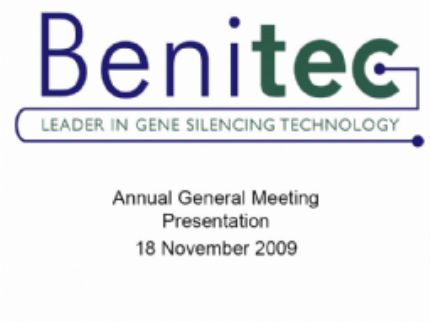Melbourne, Oct 23, 2008 AEST (ABN Newswire) - Leading developer of RNA interference (RNAi)-based therapeutics Benitec Limited (ASX:BLT)(PINK:BNIKF) announced today that Dr John Zaia, had presented an update on the human HIV trial at the 2nd Annual Cambridge Healthtech Institute's "RNAi for Therapeutics" conference held in Boston, MA USA 22-23rd October 2008.
Dr Zaia is the Chair, Division of Virology, Beckman Research Institute and is a key collaborator for the pilot human HIV study being undertaken at the City of Hope in Duarte,California. The oral presentation was entitled "Delivery of shRNA and other anti-HIV RNAs by autologous transplantation of lentivirus-transduced cells - a feasibility study".
This pilot feasibility study is a collaboration between Benitec and the City of Hope and is Benitec's first human trial. It uses a triple therapy delivered using a lentiviral vector for the treatment of HIV. The rHIV7-shl-TAR-CCR5RZ vector suppresses HIV by expressing three therapeutic nucleic acids that are directed against key steps in HIV replication.
"The final outcomes of the study are still pending however to date we have seen safe engraftment in three patients at 10 days. We have also seen gene markers in the blood months later which is very encouraging" said Dr Zaia.
"We are very encouraged by these initial findings. This is an extremely important trial as it is the first human clinical trial with expressed RNA interference trigger (shRNA) and the first triple gene therapy combination trial for HIV/AIDS. It is the also the first human trial for AIDS using lentiviral vectors transduced with hematopoietic stem cells (HSCs)."said Sue MacLeman ,Chief Executive Officer, Benitec Limited.
A copy of the conference presentation is attached. This trial is now fully enrolled. A further update on the trial including further analysis of the gene markers will be presented at the American Society of Hematology in December 2008.
The Study
The study with City of Hope is entitled, "A pilot study of the safety and feasibility of stem cell therapy for AIDS lymphoma using stem cells treated with a lentiviral vector-encoding multiple anti-HIV RNA's."
The pilot study is designed to determine the safety and feasibility of RNA-based anti-HIV therapy with lentivirus-transduced hematopoietic progenitor cells (HPC) in patients undergoing autologous hematopoietic stem cell transplantation (HCT) for intermediate and high grade AIDS lymphoma.
The lentivirus vector encodes three forms of anti-HIV RNA: RNAi in the form of a short hairpin RNA (shRNA) targeted to an exon in HIV-1 tat/rev (shI), a decoy for the HIV TAT-reactive element (TAR), and a ribozyme that targets the host cell CCR5 chemokine receptor (CCR5RZ). The vector, used to transduce autologous CD34-selected HPC, is called rHIV7-shI-TAR-CCR5RZ and was manufactured by the Center for Biomedicine and Genetics at City of Hope.
Following standard mobilization of HPC and collection by apheresis (HPC-A), a portion of the cells were cryo-preserved and left unmanipulated for later use as treatment. The remaining portion of the cells were enriched for CD34+ cells using a Miltenyi CliniMACSTM system, cryo-preserved, and later genetically modified by infection with rHIV7-shI-TAR-CCR5RZ.
The subjects underwent conditioning therapy and at the time of autologous HCT, the rHIV7-shI-TAR-CCR5RZ transduced cells were infused, followed 24-hrs later by the infusion of untransduced autologous HPC-A.
Contact
BENITEC LTD
Sue MacLeman
Chief Executive Officer
TEL: +61-437-211-200
| ||
|




